Owls are marvelous birds of mystery.
Since owls are essentially birds of the night, we see them much less than birds of the day. Thankfully, the North American barred owl is a unique exception. Unlike other owls that hate hunting during the day, the barred owl doesn’t mind the sunlight. Because of this, it’s one of the most commonly seen owls.
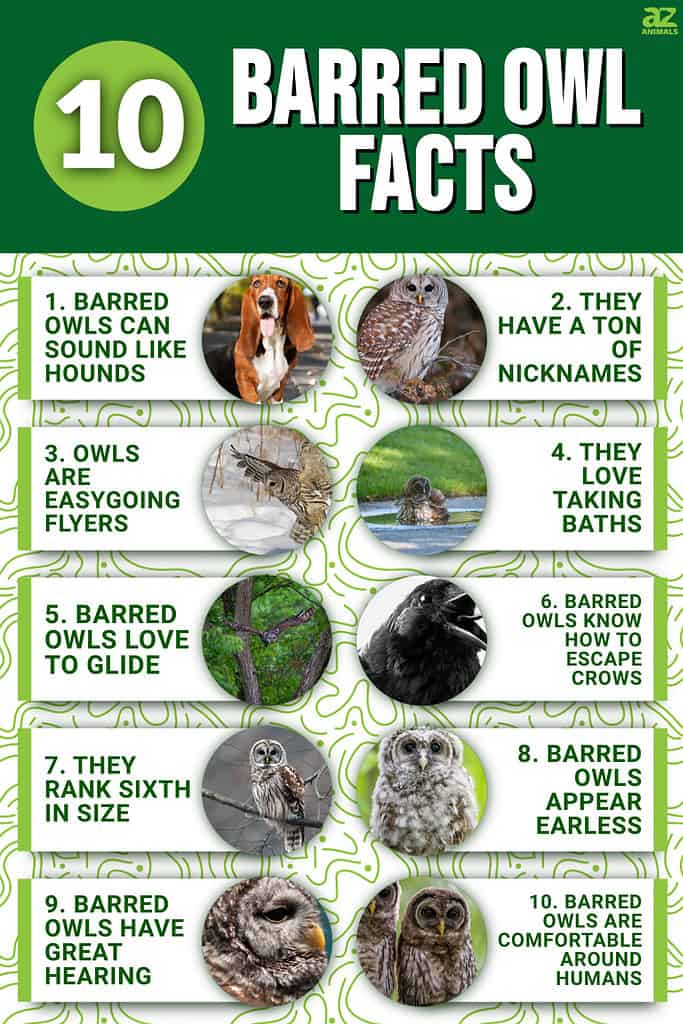
Are you ready to uncover more of the mystery? Read on to learn 10 incredible barred owl facts.
1. Barred Owls Can Sound Like Hounds

The call of the barred owl can sound like that of a hound dog.
©iStock.com/artisteer
A barred owl can sound like a howling hound dog if it wants to! The barred owl is one of the most vocal in North America. It also has one of the broadest ranges of calls. One of the barred owl’s calls sounds almost identical to a hound. It can trick even the most experienced raccoon hunters.
A barred owl also makes weird shrieks, cries, screams, grumbles, squeaks, and hootings. The barred owl’s far-carrying calls can be heard several miles away. In the Pacific Northwest, excessive barred owl calls and populations are displacing spotted owls.
2. They Have a Ton of Nicknames
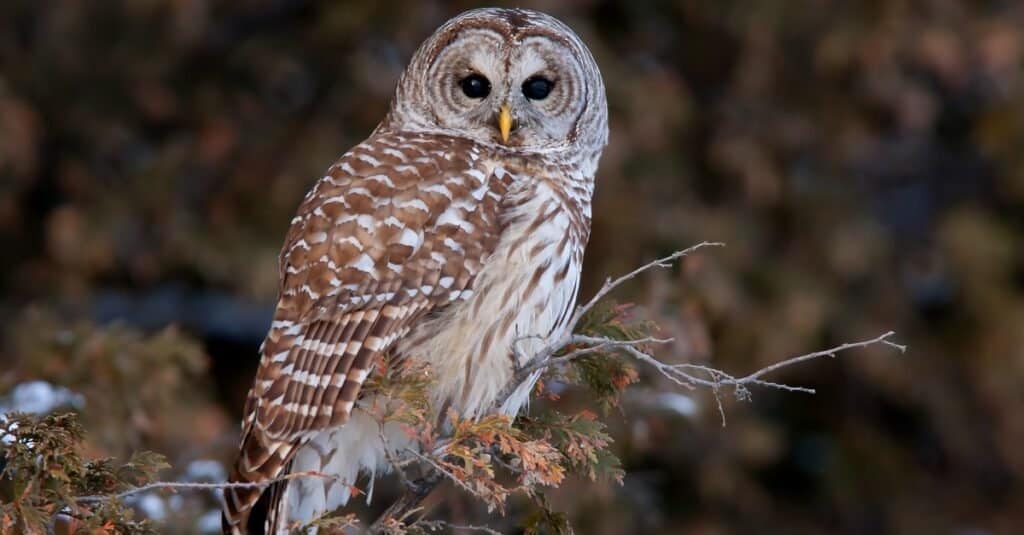
Barred owls are often called hoot owls.
©Jim Cumming/Shutterstock.com
There are three barred owl subspecies. First, there’s the northern barred owl. There’s also the Florida-barred owl. Finally, there’s the Texas-barred owl. All three of these subspecies have unique nicknames.
Sometimes people refer to the barred owl as a hoot owl because of its piercing cry. One of the French Canadian names (Le Chat-huant Du Nord) means the hooting cat of the North.
Since barred owls love to hoot before a rain storm, they’re also called rain owls. Thanks to their distinctive large head, some people call them the round-headed owl. Finally, barred owls are sometimes referred to as swamp and wood owls.
3. Owls Are Easygoing Flyers
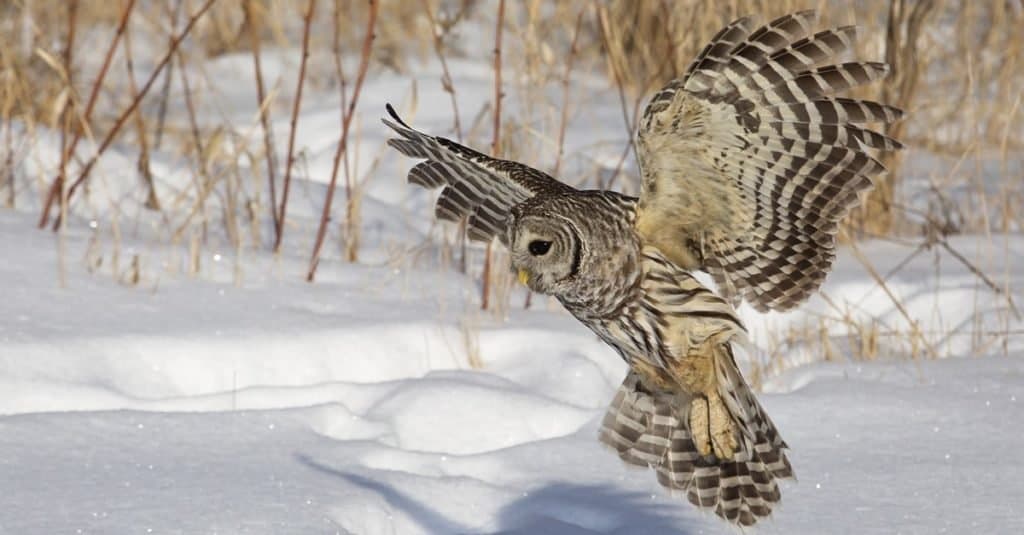
Barred owls are easygoing, graceful flyers.
©Lynn_Bystrom/Shutterstock.com
Some owls have a look of urgency when they fly. But not the northern barred owl. In flight, the barred owl appears to be easygoing and laid back. They have a thick, lumbering, carefree aspect up in the air. Their wings beat a little bit slower than the great-horned owl. The smooth flight of the barred owl is even more graceful than the snowy owl.
If you ever see a barred owl in flight, its wings might appear slightly stubby and broad. This is because of the dense plumage on their body. However, the wings are in perfect proportion to their body. They just look chubby!
4. They Love Taking Baths
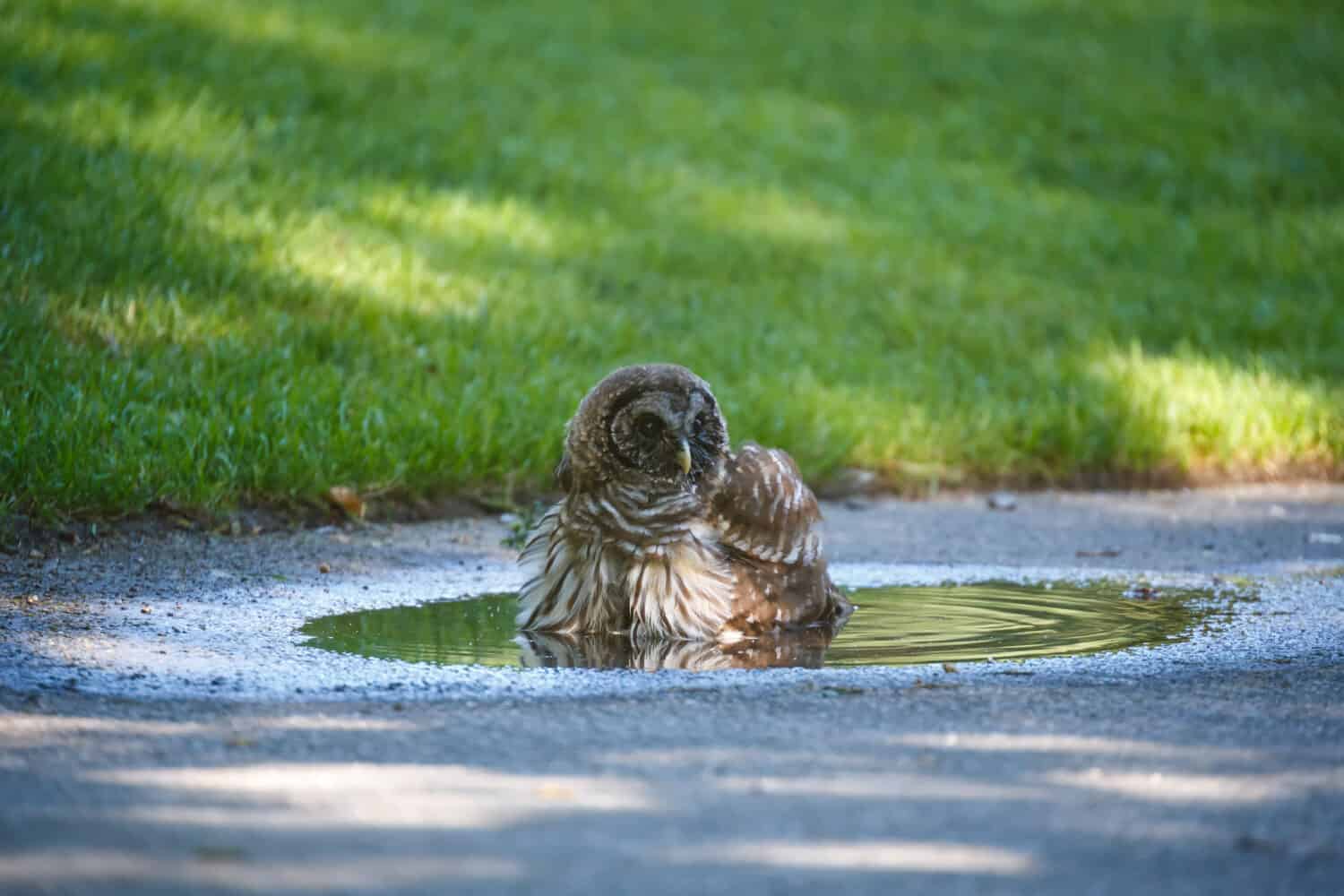
Barred owls love baths so much that even a puddle will do!
Image: Feng Yu, Shutterstock
©Feng Yu/Shutterstock.com
Barred owls make a habit of drinking water frequently and bathing often. A barred owl enjoys bathing, even in the middle of winter! Some people will use bird baths to attract barred owls to their yards. If you ever get a chance to see a barred owl bathing, it’s an impressive sight. They look like they’re having fun as they work to clean through their plumage.
5. Barred Owls Love to Glide
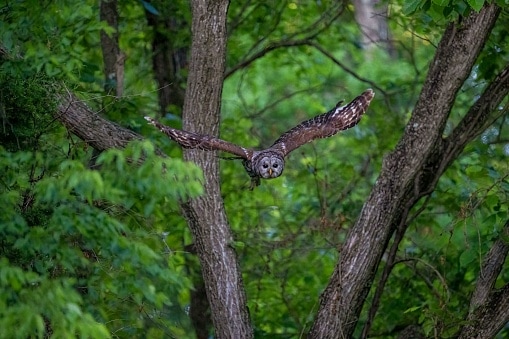
A barred owl can glide swiftly through the woods.
©Wirestock/iStock via Getty Images
You’ll rarely ever see a barred owl soar. However, they love making direct glides through the woods while hunting. When gliding, they have a flat wide pattern. The glides occur close to the ground, under the lowest limbs of the surrounding trees. The slow-beating wings have a certain heaviness and methodical nature to them.
6. Barred Owls Know How to Escape Crows
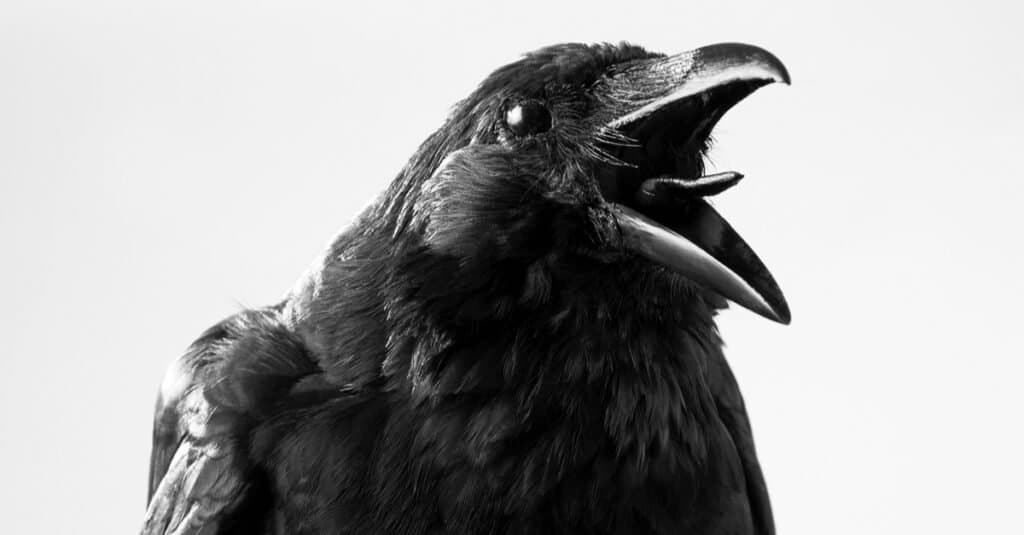
Barred owls are good at escaping mobs of crows.
©redpip1984/Shutterstock.com
In the avian world, fights are a daily occurrence. Sometimes smaller birds will gang up on a large bird to protect their territory.
When it comes to owls vs crows, barred owls have an advantage. If a mob of crows pursues them, it knows precisely how to elude them!
When in a chase, a barred owl can fly quite high and swiftly. Because it’s highly skilled at maneuvering in dense forest and swamp growth, the owl can weave its way through tree branches. It’s a miraculous thing to see! They’re a silent flyer and great at escaping danger.
7. They Rank Sixth in Size
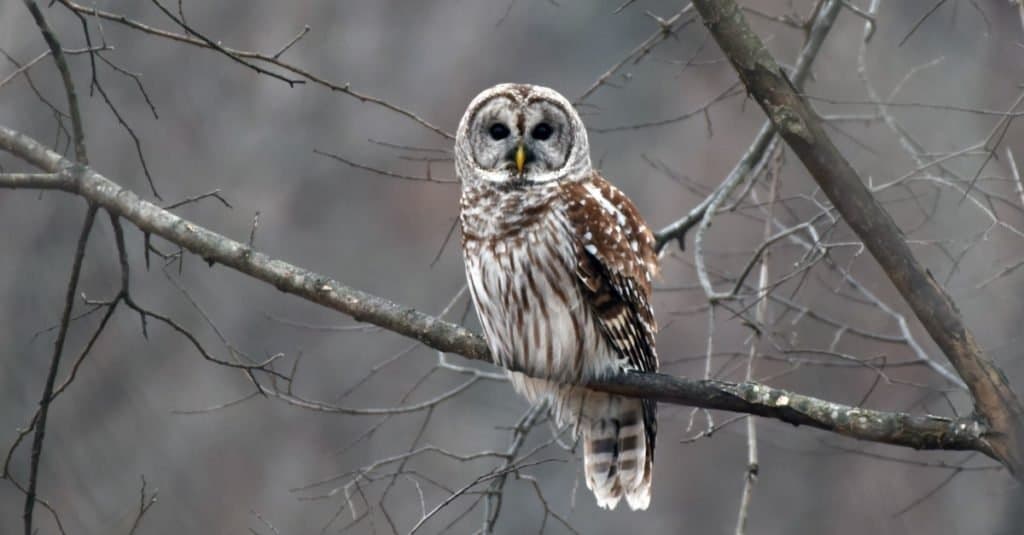
Barred owls are the sixth largest owl species in North America.
©Malachi Ives/Shutterstock.com
Out of all 19 North American owl species, the barred owl ranks sixth in size. The northern barred owl is one of the giant owls, and it’s easy to recognize them. They have barred plumage and large rounded heads. Their neck plumage is significantly puffed up, giving them an almost chubby-like appearance.
The barred ruff of the owl’s throat gives it a prominent double chin. They look as if they’re brooding and in deep thought. Unlike the fierce look of a great-horned owl, a barred owl has a peculiar innocence. Finally, even though they’re so large, barred owls have tiny feet.
8. Barred Owls Appear Earless
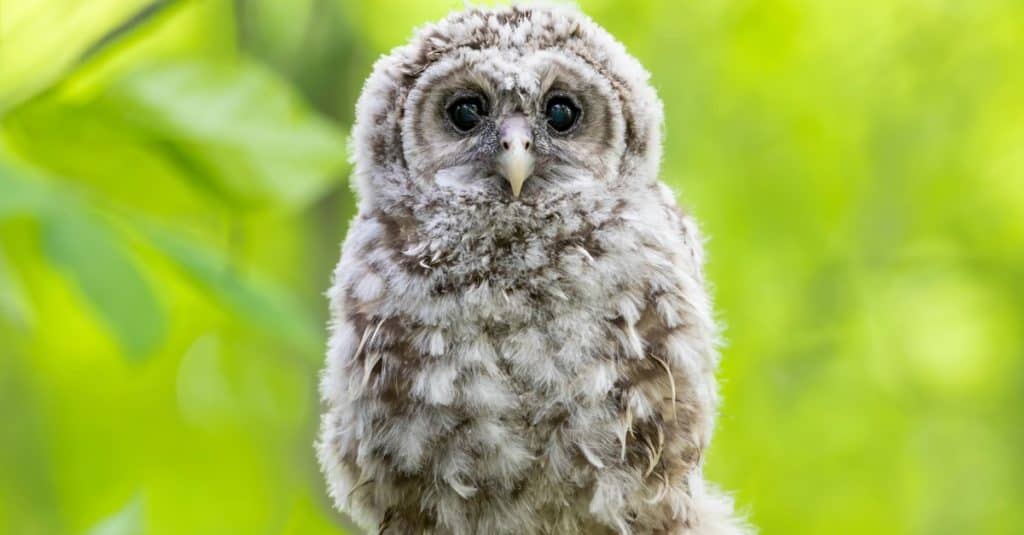
Barred owls appear earless, even though they have large ear cavities.
©Jim Cumming/Shutterstock.com
Some owls have little tufts on their head that resemble ears. However, the northern barred owl appears to be earless! Even though the owl has ears on either side of its head, its plumage completely conceals them. The large, earless head helps contribute to the barred owl’s puffy appearance. Underneath the plumage, the barred owls have large ear cavities that can pick up on the slightest sounds.
9. Barred Owls Have Great Hearing
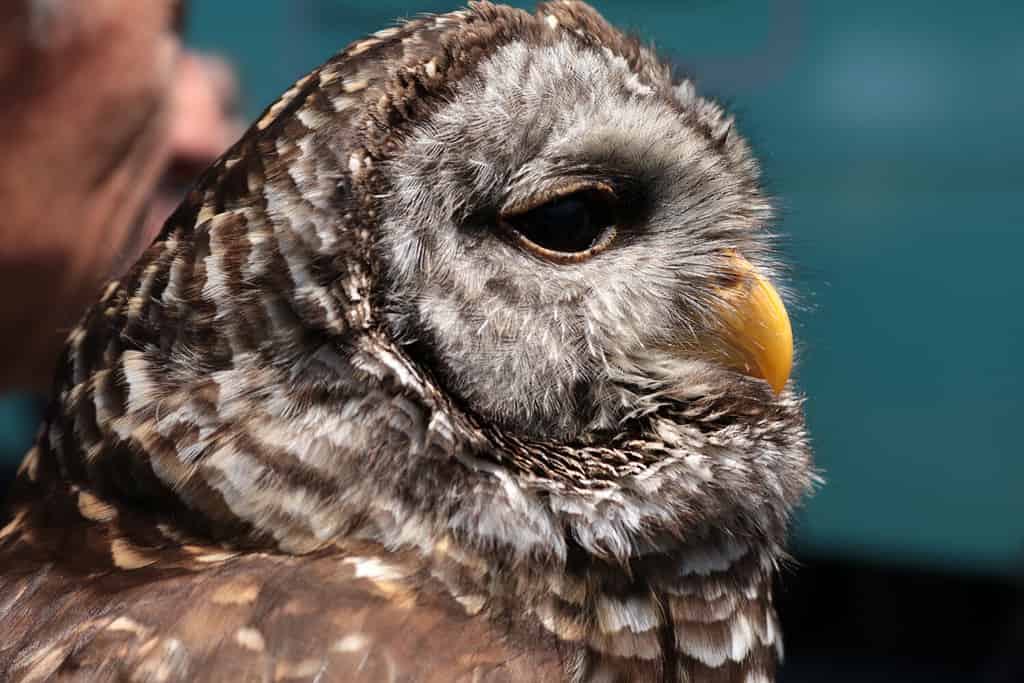
The barred owl can hear a mouse at 25 yards.
©Daniel J. H. McDonald/Shutterstock.com
Barred owls have asymmetrical ears that are perfect for highly accurate sound locating. They can fly a distance of over 50 yards at the faintest squeak of a mouse! If a mouse is running across the earth, it can hear that at 25 yards.
If a rodent rustles around and dried leaves, it will become a meal for the barred owl. The northern barred owl has such great hearing that it’s practically impossible for a human to approach them unheard.
10. Barred Owls Are Comfortable Around Humans
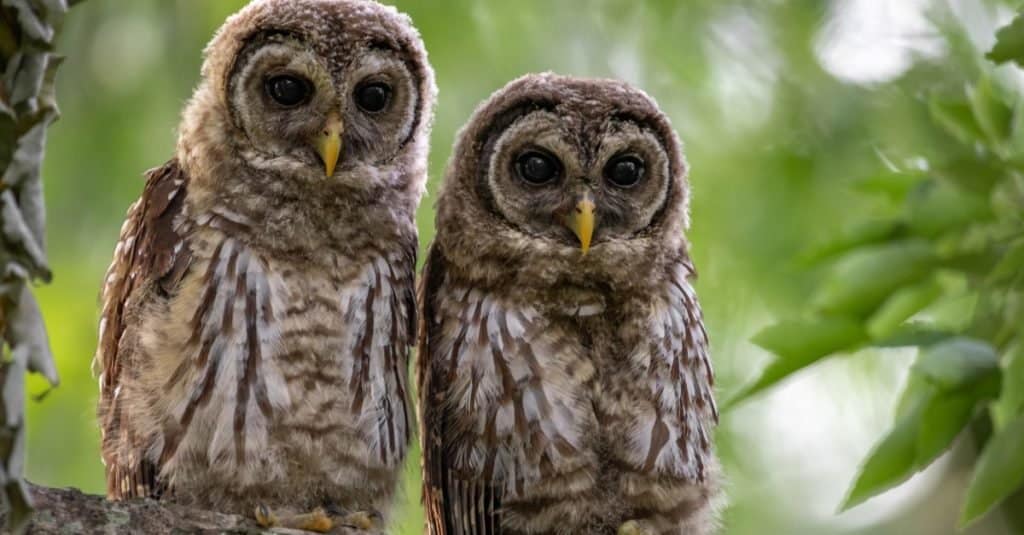
Barred owls are comfortable being around humans.
©iStock.com/Harry Collins
Furthermore, barred owls show little fear of human voices or movements. Unlike other owls, even the tiny ones, it’s rare for a barred owl to attack a human being. They’re known for visiting campsites and hanging out in towns.
Sometimes their comfortable nature around humans equals trouble for trappers. It’s not uncommon for a northern barred owl to steal the meat used as bait in a hunter’s trap.
It’s also not unusual for a barred owl to land close to you when sitting by the campfire. They’ll set a few feet from the flames, hoping to catch an insect attracted to the fire’s glow. There are even numerous accounts of barred owls entering towns in large cities at night to hunt for rats and mice.
The photo featured at the top of this post is © Steve Collender/Shutterstock.com
Thank you for reading! Have some feedback for us? Contact the AZ Animals editorial team.






